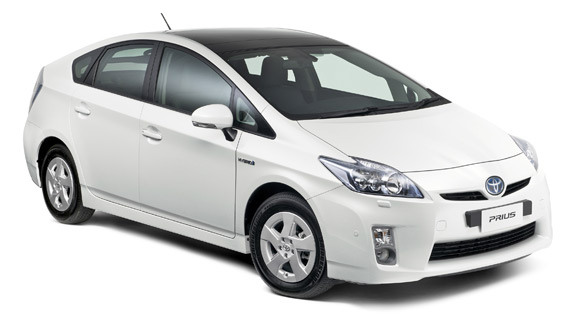The fight for the most sustainable engine isn’t over. Plus: The latest Prius, reviewed
The fight for the most sustainable engine isn’t over
ABOVE: The Prius, Toyota’s petrol/electric hybrid car
In the simplified world of fuel efficiency tests, hybrid electric vehicles (HEV) win almost every time. On paper, there’s nothing more efficient and cleaner burning than an HEV. Trouble is, none of us live in a simplified world. Cost, practicality, power, style—the realpolitik of car ownership is more complex than any test can handle.
So what’s a green driver to do? We already know that modern diesels beat petrol by up to 40 percent on fuel efficiency. And the new regulations on diesel have cleaned up the fuel, eliminating in large measure nasty sulphides, although New Zealand still has to catch up to Europe on that front. Eliminating petrol as an also-ran*, what’s better, an HEV or a super-efficient diesel? Here’s the case for both.
Diesel
Proven technology: The first diesel was built in 1932, so it’s a known quantity for parts, mechanics and resale values. The first commercial HEV, the Toyota Prius, was released only 12 years ago, in 1997.
Lifetime: The average life expectancy of HEV batteries is ten years. What then? Diesel engines typically have a longer life than petrol engines, thanks to lower engine speeds and cooler exhausts. Depending on how it’s nursed, a diesel engine could last forever.
Power: Diesels have enormous torque, providing faster acceleration with less engine strain than petrol or HEVs. While HEVs are more efficient in electric mode, the petrol engine must kick in sometimes to achieve comparable acceleration to diesels, negating the efficiency benefits. As a result, diesels can be considerably more fuel efficient on the open road, or over hilly terrain.
HEV
Efficient and cleaner: There’s no denying that in their class hybrids are mostly more efficient and always cleaner burning. There are exceptions: the latest Mini Cooper D claims the same efficiency as the new Prius with 3.9 litres per 100 kilometres.
No road-user charges: New Zealand persists with the outmoded road-user charge on diesel. This effectively puts a tax on all diesel vehicles.
The best of both worlds: Two features that make hybrids so efficient are that the combustion engine stops when it’s not required, and that the batteries can be recharged under deceleration. But new developments like start-stop technology and BMW’s Brake Energy Regeneration mean diesels are beginning to rival hybrids on fuel economy.
So which is best?
There’s no right or wrong between hybrids and the best diesels—only informed choice. For around-town city-hopping an HEV will likely offer the cleanest choice. But if your lifestyle takes you further afield, then the difference can come down to decimals. In which case, style criteria may become the decider.
Toyota G3 Prius
The third generation of the world’s flagship green car is evolutionary rather than revolutionary. Toyota’s Hybrid Synergy Drive system has been significantly enhanced, with a larger, more powerful engine, greater acceleration and more horsepower—yet it delivers better fuel economy than any mass-produced vehicle on the road, and its minimal CO2 emissions lead the fleet.
The new Prius is available in two models: standard and the pricier, higher-spec Prius i-Tech, with bells and whistles including radar cruise control, solar-powered air conditioning, front seat heaters and an intelligent parking assist system—yes, the car parks itself if you’ve yet to learn the art of parallel parking.
While Toyota has sacrificed style for increased efficiency, the new Prius is clean, green and cheap to run. As driving goes, it’s relatively guilt-free, and for a hybrid it has a fair bit of grunt.
Estimated fuel use: 3.9 litres/100km (11% improvement on previous model)
CO2 emissions: 89 g/km (16% improvement)
Engine: 1.8 litre four-cylinder petrol engine (delivers 73kW of system output) and electric motor (delivers 27kW)
Best features: More fun than a kid’s playground, the Prius is loaded with geeky extras. My favourite is the solar ventilation system: solar panels in the roof that power the vehicle’s ventilation and keep the car cool while parked on sizzling summer days. The i-Tech’s parking assist system, which allows for effortless parking, is an added bonus. Oh, and did I mention the impressive fuel economy and eco-drive monitor, which teaches you how to drive for optimal fuel efficiency?
Worst feature: While the Prius undoubtedly screams eco-warrior, Toyota hasn’t built a beautiful car. Its distinctive, wedge-like exterior looks like something from Star Wars. The interior, while modern, comfortable and functional, lacks the panache you’d expect for a car of this price—although if you’re prepared to pay the $15,000 premium, the i-Tech’s heated leather seats provide some ambience. But even the standard model is on the expensive side for a medium sedan; it seems being a 21st-century hippie can be an expensive habit.
Style rating: Low—and this car looks better than the previous model! Developed with aerodynamics not fashion in mind, the Prius lacks soul (if you’ve owned an Alfa Romeo you’ll know what I mean). It also lacks masculinity and flair—key prerequisites for some motorists, especially in the fleet car market.
My recommendation: If you’re into saving the planet, reliability and driving something with a swag of mod cons, then the Prius is for you. If style, soul and panache are more important, then you may be happier with a European diesel. Model-wise, the standard Prius will do the trick if saving fuel is your number-one motive. If the latest technology and butt warmers are more your thing, and you have an extra $15k to spend, then go for the i-Tech.
The facts:
- Prius standard model: $47,490
- i-Tech model: $62,090 Prius
- Length: 4460mm
- Width: 1745mm
- Height: 1490mm (standard), 1505mm (i-Tech)
- Fuel tank: 45 litres







